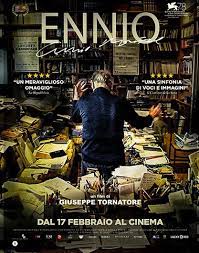
ENNIO
Italy, 2021, 156 minutes, Colour.
Directed by Giuseppe Tornatore.
Ennio (not any Oh! As Dragon Speech Registration prints out) but THE Ennio, the first Ennio who comes to mind, Italian maestro, Ennio Moricone. Practically everyone recognises the whistle of The Good, the Bad, and the Ugly, and the beats and flutes of The Mission. And, by the time of his death in 2020, aged 91, he was revered in music circles worldwide.
It is important to note, first, that this film has been directed by Giuseppe Tornatore for whom Moricone scored Cinema Paradiso and The Legend of 1900, being tribute himself enthusiastically but including an enormous range of talking heads, a great number of Italians, Americans like John Williams, Hans Zimmer, Quincy Jones and Bruce Springsteen, and many admiring directors, Clint Eastwood, Quentin Tarantino, Terrence Malick, Oliver Stone, Roland Joffe, Bruce Levenson, Dario Argento, Bernardo Bertolucci, Wong Kar Wai. No shortage of admirers. As we all are.
Perhaps best to say now that this is really a masterclass. And there is so much in it, that many will want to see it again. Yes, it contains the key phases in Moricone’s biography but it is also a portrait, so much of the material from interviews with Monicone himself, at different stages of his life and career, so that we spend a great deal of time with him. But, overall, it is a masterclass in musical composition, a great deal of theory and explanations (and challenges), a great amount of music to be heard on the score.
The first section is a must for students of composition. Film lovers will be have to be patient but will have an opportunity to understand the richness of the compositions, arrangements and orchestrations, choice of instruments (and sounds) which will enhance hearing the music they love.
Then the portrait moves to his film scores, Italian features and television of the first half of the 1960s, his wariness about working on film scores and their status in musical composition, the beginnings of his collaboration with Sergio Leone for all of his films for 20 years, from Fistful of Dollars to Once Upon a Time in America, then his work on so many spaghetti westerns, Italian gialli (pulp fictions) as well as for celebrated Italian directors, Dario Argento, Bernardo Bertolucci, Pier Paolo Pasolini, and then an increasingly surprising number of American films.
1986 and the Oscar audience was stunned when he did not win the Oscar for The Mission (and scenes of producer, Lord David Putnam, apologising), and finally a tribute with an Oscar for Life Achievement.
As he grew older, he worked on more classical styles and orchestrations and toured widely, live concerts as well as television concerts.
There is an interesting postscript for film lovers and buffs – his being persuaded, aged 85, by Quentin Tarantino to score The Hateful 8, and the accolade of winning the music Oscar in his own right.
While this is a review, it is also an encouragement to see (and hear) Ennio.